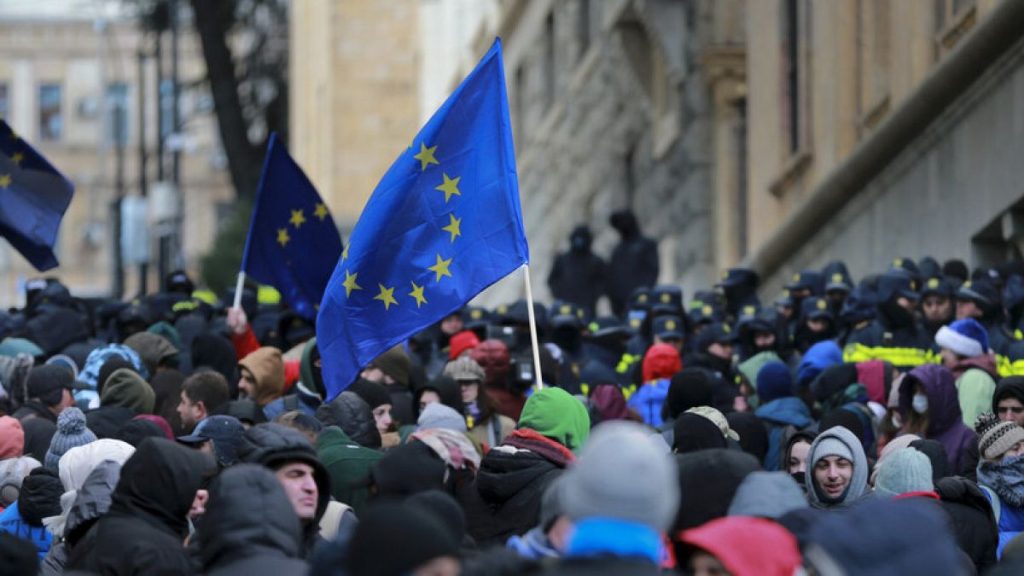The political landscape in Georgia has been marred by escalating tensions and violence, culminating in a series of attacks on participants of a three-hour general strike organized by opponents of the ruling Georgian Dream party. The strike, intended as a demonstration against the government’s decision to suspend EU membership talks, was met with orchestrated violence, reportedly perpetrated by individuals hired by the ruling party, known colloquially as “titushky.” These hired thugs, wielding batons and engaging in both physical and verbal assaults, targeted protesters from various companies who had joined the nationwide strike. The attacks, captured on video and widely circulated on social media, depict a disturbing scene of violence against citizens exercising their right to protest. This incident underscores the growing concerns about the erosion of democratic freedoms and the increasing use of intimidation tactics against political opponents in Georgia.
The backdrop to this escalating tension is the government’s controversial decision to suspend EU membership talks, a move that has sparked widespread public disapproval and fueled accusations that the country is drifting towards isolationism. The general strike, involving over 350 businesses across the country, aimed to send a clear message about the potential consequences of such isolation, highlighting the economic and social repercussions that could ensue. Protestors, carrying Georgian and European Union flags, took to the streets of Tbilisi and other cities, chanting slogans and blowing whistles to express their dissent. The violent response from the ruling party, however, served to escalate the situation and further polarize the already tense political climate.
The attacks on strike participants are not isolated incidents but rather part of a broader pattern of increasing violence against political opponents in Georgia. Just days before the strike, Giorgi Gakharia, the country’s former Prime Minister and now a leading opposition figure, was brutally assaulted in what he described as a coordinated attack orchestrated by the founder of the Georgian Dream party, Bidzina Ivanishvili. The attack, which resulted in Gakharia’s hospitalization, was condemned as a politically motivated attempt to intimidate the opposition and suppress dissent. This incident, coupled with the attacks on strike participants, paints a worrying picture of the current political climate in Georgia, where violence and intimidation are increasingly employed to silence dissenting voices.
Gakharia, in a statement released on social media following the attack, directly accused Ivanishvili of orchestrating the assault, highlighting the deep divisions and personal animosity that characterize Georgian politics. The statement further emphasized the political nature of the attack, framing it as a deliberate attempt to silence opposition voices and stifle dissent. Gakharia’s subsequent update on his health, while reassuring supporters of his recovery, did little to alleviate the underlying concerns about the escalating violence and the shrinking space for political opposition in the country. The attack on a prominent political figure like Gakharia, combined with the widespread violence against peaceful protestors, serves as a stark warning about the deteriorating state of democratic freedoms in Georgia.
The escalating violence and the targeting of political opponents raise serious questions about the future of democracy in Georgia. The government’s decision to suspend EU membership talks, coupled with the violent response to public dissent, suggests a worrying trend toward authoritarianism. The use of “titushky” to intimidate and attack protestors echoes tactics employed by other regimes seeking to suppress opposition and maintain power. The attacks on Gakharia and the strike participants, along with the broader crackdown on dissent, signal a dangerous erosion of democratic principles and raise concerns about the government’s commitment to upholding fundamental freedoms.
The international community must closely monitor the situation in Georgia and hold the government accountable for its actions. The escalating violence, the attacks on political opponents, and the suppression of dissent cannot be tolerated. It is crucial for international organizations and democratic nations to exert pressure on the Georgian government to uphold its commitments to democratic principles and respect the rights of all its citizens. The future of democracy in Georgia hangs in the balance, and the international community must play a crucial role in ensuring that the country does not descend into authoritarianism. The attacks on protestors and opposition leaders are a stark reminder of the fragility of democratic institutions and the importance of vigilance in protecting them.














